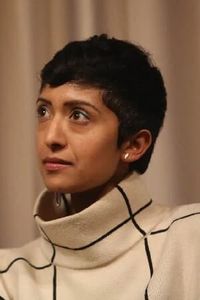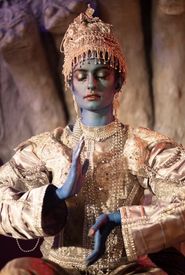Michelle Williams Gamaker is a multifaceted artist whose diverse creative pursuits traverse the expansive territories of moving image and performance, deftly navigating the complex intersections of art, film, and narrative.
Williams Gamaker's creative endeavors are deeply rooted in the concept of "fictional activism", a visionary approach that seeks to revolutionize the cinematic landscape by repositioning marginalized brown characters at the forefront of the narrative. This innovative movement involves the resurrection of these underrepresented protagonists as empowered, vocal champions, who boldly confront the fictional injustices and systemic inequalities that have long been perpetuated against them.
Through a multifaceted approach that encompasses scriptwriting, actor workshops, the acquisition of authentic film props, and the meticulous construction of elaborate film sets, Williams Gamaker meticulously recreates the artificial worlds that have captivated their passion for cinema. Each element, from the written word to the visual representation, is carefully crafted to bring these fictional characters to life, imbuing them with a sense of agency and authenticity that challenges the status quo and inspires meaningful change.
Williams Gamaker has recently brought to fruition a meticulously crafted trilogy of films, aptly titled "Dissolution", which comprises three thought-provoking cinematic endeavors: "House of Women" (2017),"The Fruit is There to be Eaten" (2018),and "The Eternal Return" (2019).
This ambitious trilogy delves into the realm of the subconscious, as characters from the 1947 cinematic masterpiece "Black Narcissus" by Powell and Pressburger begin to experience a profound sense of disorientation. As they become increasingly aware of their artificial surroundings, the boundaries between their screen lives and staged realities start to blur, leading to a fascinating exploration of the human psyche.
The notion of fictional activists embodies an extraordinary level of versatility, permitting Williams Gamaker to adopt a multitude of personas, including her alter ego Violet Culbo, or to collaborate with other artists who take on diverse roles.
For instance, she has worked with long-standing collaborators, including the renowned Indian-born US film star Sabu, as well as characters such as Kanchi from the critically acclaimed 1947 film Black Narcissus, and O-Lan from the 1937 cinematic masterpiece The Good Earth.
Williams Gamaker's creative endeavors have been significantly enriched by her ongoing collaboration with American artist Julia Kouneski, a partnership that has spanned over a decade, from 2009 to the present day.












